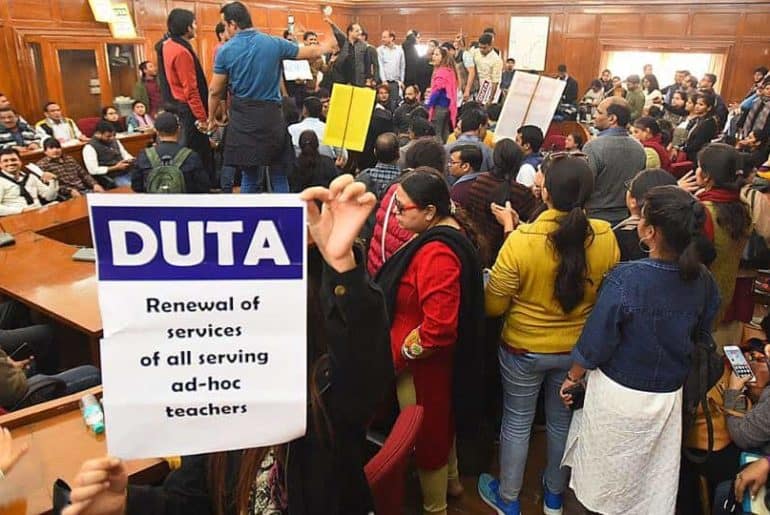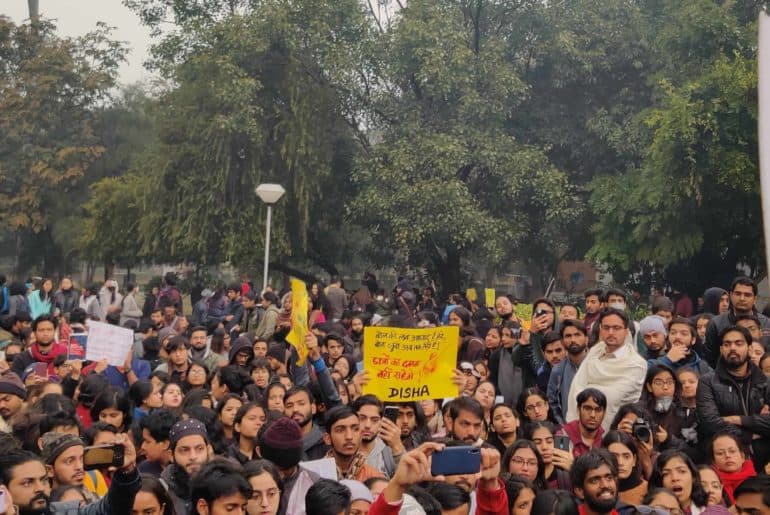These are powerful times. These are politically volatile times. These are disappointing times. These are resisting times. Most important of all, these are questioning and questionable times.
With the Citizenship Amendment Act (CAA) and the National Register of Citizens (NRC) being protested against vehemently in the North-East and across the rest of the country, including the popular hubs of politics and entertainment – Delhi and Mumbai – respectively, the citizens of the country are awakening to the anti-people policies of the current administration, including (but not limited to) the controversial abrogation of Article 370 in Kashmir, the policies to privatize education, the Trans Person’s Bill, and the continual curbing of dissent by arresting protesting activists. As I write this, the Farmers’ Leader, Akhil Gogoi, is being charged under the Unlawful Activities (Prevention) Amendment Act – a move that has invited widespread criticism for its arbitrary and oppressive nature.
In a backdrop such as this, it is impossible to go about one’s life – especially as students who study Foucault, Orwell, Ambedkar, and Marx in the classrooms of one of the premier universities of the country – without being the least bit affected with the socio-political climate of the country. The slogan, “Personal is political” manifests itself powerfully before us, now more than ever, since the majority of us who are on any social networking platforms like Instagram, Facebook, or Twitter, among many others, cannot possibly scroll through the feeds nonchalantly, without coming across stories, posts, or articles on the current climate. What, then, becomes of social media activism?
I confess that I myself, in the past, have sneered at ‘social media influencers’ and the like, believing that the social and cultural capital enjoyed by them, by virtue of their popularity, was taking up unfair space in the powerful discourse of ground-level activism. However, the past few months have altered this perspective drastically, because social media has now seemingly emerged as the preferred space of discourse for many, includingsystematically disenfranchised communities like trans-people, women, and people from conservative households. When paramilitary troops and police forces are employed in the ratio of three is to one, at organised protests in India Gate, Jantar Mantar, and brutalise the students of Jamia (JMI), Jawaharlal Nehru University (JNU), and Aligarh Muslim University (AMU), among other locations, then being on-ground becomes a life and death battle for many from the aforementioned communities.
Social media, then, serves as the forum to express dissent, become informed, and share awareness. This is not to say that the women at Shaheen Bagh, sitting in the chilling winter of Delhi for about a month now, are not palpable to a violent crackdown, or that the resistance that has engulfed Kashmir for multiple decades is on equal footing with sharing a tweet, but it is to acknowledge the newfound power that is threatening the authorities in control. Bharatiya Janata Party’s (BJP’s) IT cell has been notoriously in the news for circulating numbers, advertising that calling said numbers would get the people “free subscription to Netflix” or rendezvous with porn-stars. Doctored photos of students holding placards like “Hinduo ki kabrkhudegi” instead of the original “Hindutva ki kabra khudegi,” were instantly circulated in social media pages, attempting to polarize communal sentiments against students at JMI and AMU. In no time after actress Deepika Padukone stood behind JNU Students’ Union President, Aishe Ghosh, and activist Kanahiya Kumar, that the hashtag “BoycottChhapak” was trending on social media and sexually profanity being hurled at her. Internet lockdown in Kashmir has continued for over 150 days now, while internet services in numerous states like Uttar Pradesh, Karnataka, Assam, and Gujarat were blocked. Instances like this are testimony to the fact that any platform of public dissent, especially a technologically savvy one like social media that people from older generations in the administration are largely unable to grasp or master, acts to counter the narrative of normalcy our Prime Minister has been propagating with his famous line – “Sab changa si!” A single tweet on the everyday violence in the country is indeed momentous enough to throttle this false narrative.
While the criticism against social media has always been the legitimacy of the sources and the accountability of any debates/discussions over it, private citizens like Mitali Bhasin, Sukhnidh Kaur, Pravan Sawhney, Divya Kandukuri, are some of the few names who have set precedent for researching their own resources for news and compiling information for public use in these tumultuous times. Pages like With Kashmir, and media houses like The Wire, The Print, Quint have proven to be reliable sources of information and discourses, publicized and accessible through social media platforms.
The language barrier parting English, Hindi, and other regional languages in India has always been a drawback for left liberal discourse in India, and the dearth of similar resources / activism in languages apart from English, including in Hindi, remains a blind-spot that needs correction in an era where the voting public, from Savarna households, including in our family WhatsApp groups is unaware of the manipulation and propaganda being targeted towards them, because of language or technological gaps that disengage their participation in social media activism. However, as millennials and post-millennials, it is our prerogative to engage in sharing the information that reaches us, creating the much-needed space for dissent amid the hoardings of propaganda.
Most important of all, it is time that to take heed of all the tools at our disposal in fighting violence sponsored by the State. It is time to change those display pictures to red, to make highlights on Instagram with curated information, to tweet and flood the judiciary, the Police, and the ministries, because when we fight fascism in Orwellian times like these, it becomes poignant to break free, in any and all ways possible, from what 1984 labelled the Thought Police.
Anushree Joshi
[email protected]













